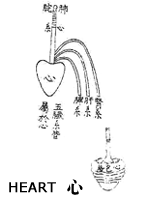 Heart from a TCM Perspective Heart from a TCM Perspective
In TCM, the functions of the heart are different from those of the anatomical heart, as it is understood in western medicine. The heart organ represents a group of physiological functions. In addition to regulating the cardiovascular system, it is responsible for maintaining the nervous system's functions.
"The heart rules the blood and blood vessels"
The heart is the functional unit for regulating blood flow. Blood is transported inside the blood vessels around the entire body when the heart pumps. The heart, blood and blood vessels are united by their common activities. In TCM, this functional relationship is known as the "ruling" of the heart.
Heart qi refers to the pumping actions of the heart. If heart qi is abundant and sufficient, the heart pumps at a normal pace, transporting blood smoothly inside the blood vessels, the pulse is regular and strong, and the face will look brilliant. As a result, the body is able to obtain from blood the nutrients needed to sustain life. On the other hand, if heart qi is deficient, blood cannot maintain an efficient flow in the blood vessels, and the pulse is weak. The individual looks pale, and the tongue also appears pale and white. Without healthy ruling of the heart, individuals will experience palpitations, chest discomfort and pain.
"The heart rules the spirit"
In TCM, the heart stores the "spirit". In general, the "spirit" refers to an individual's vitality, which is reflected in the eyes, speech, reactions and overall appearance. Specifically, the "spirit" refers to a person's mental, cognitive and intellectual abilities. The heart takes charge of mental activities by mastering other organs and their physiological functions. If the "spirit ruling" is good, the individual will be wise and have a clear and fast mind. If there is heart disharmony, signs like forgetfulness, poor self esteem, and slow thought processes or reactions occur.
"Sweat is the fluid of the heart."
Sweat comes from body fluids, which are an essential and integral part of blood. Blood is ruled by the heart and is the main fluid of this organ. Because sweat comes from the same origin as blood, in TCM over-sweating is considered an exploitation of qi and heart blood, leading to symptoms such as palpitations. As a result, people who sweat abnormally usually have a heart deficiency. If such sweating is spontaneous, the disharmony belongs to a deficiency of heart yang. If it takes place at night, the disharmony belongs to a deficiency of heart yin.
"The heart opens into the tongue. The heart's brilliance is manifested in the face."
In TCM, both the tongue and face are windows for the heart and blood. The heart "opens into the tongue" because they are connected. By observing the tongue and looking for the "heart's brilliance to be manifested in the face," a lot can be learned about how the heart is functioning. For example, if heart function is normal, individuals will have bright, healthy red cheeks and the tongue will appear pink. If there is blood stasis (where blood is not able to flow smoothly through the blood vessels), the face and tongue will appear purple. A healthy blood supply is also essential for providing nutrients for hair growth, because in TCM, hair is thought to be the "remains of blood." If hair growth is affected, it may indicate a problem with the heart and blood.
Click here to read more about the Heart Meridian.
|